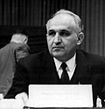Portal:Communism/Selected biography/29
Todor Khristov Zhivkov (Bulgarian: То̀дор Хрѝстов Жѝвков, tr. Todor Christov Živkov; IPA: [ˈtɔdɔr ˈxristɔf ˈʒifkɔf]; 7 September 1911 – 5 August 1998), was the communist head of state of the People's Republic of Bulgaria (PRB) from 4 March 1954 until 10 November 1989.
He became First Secretary of the Bulgarian Communist Party in 1954 and remained on this position for 35 years, until 1989, thus becoming the longest-serving leader of any Eastern Bloc nation, and one of the longest ruling non-royal leaders in history. His rule marked a period of unprecedented political and economic stability for Bulgaria, marked both by complete submission of Bulgaria to Soviet rule and a desire for expanding ties with the West. His rule remained unchallenged until the deterioration of East-West relations in the 1980s, when a stagnating economic situation, a worsening international image and growing careerism and corruption in the BCP weakened his positions. He resigned on 10 November 1989, under pressure by senior BCP members due to his refusal to recognize problems and deal with public protests. Within a month of Zhivkov's ouster, Communist rule in Bulgaria had effectively ended, and within another month the People's Republic of Bulgaria had formally ceased to exist.

